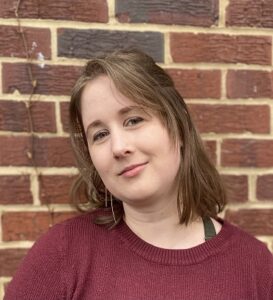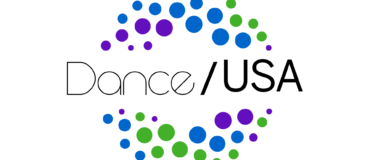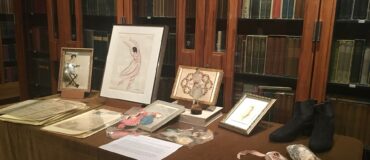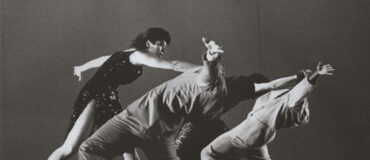By Hallie Oines
Hallie Oines is a 2022 Archiving and Preservation Fellow with Dancing Wheels Company & School. Read more about the Fellowships here. This is the first part of Hallie’s blog.
August 30, 2022: Managing Priorities and Expectations
In March of 2022 I was given the honor of joining the summer 2022 Archiving and Preservation Fellowship cohort with Dance/USA. My work is to establish the foundations needed for processing and organizing the collection at Dancing Wheels as well as create a traveling exhibition that depicts the 42-year history of the organization.
The Dancing Wheels Company is a physically integrated dance company, highlighting the talents of dancers with and without disabilities. It was founded by Mary Verdi-Fletcher, the first and one of the foremost professional wheelchair dancers in the United States. By creating Dancing Wheels, Mary has expanded the world of dance to many people who thought they could never be a part of it. Expanding inclusion and representation has provided joy and a sense of community to countless individuals. The organization has national, international, and local outreach programs to schools and afterschool programs, as well as classes at the studio, all of which encourage inclusion and increased interest in the performing arts. Students have traveled across the country to learn from Mary as they see Dancing Wheels as an opportunity to fulfill dreams that have long been discounted. Dancing Wheels illustrates that it is the spirit of dance that is important, not the perceived restrictions of a person’s physical body.

DeMarco Sleeper and Marissa Thomas performing This Day, choreographed by Donald Byrd. Photograph taken by Mark Horning.
Due to how strongly I believe in the work that Dancing Wheels accomplishes, I was determined to complete the traveling exhibit, and the full processing of the collection. However, once I arrived in Cleveland and saw the collection in person, I became uncertain about whether that was feasible within the scope of my Fellowship. The Dancing Wheels Company collection consists of 7 rooms full of items that are in need of organization, inventorying, weeding, and rehousing. The collection consists of multiple material types ranging from textiles, to large wooden set pieces, to born-digital records. I struggled at first to imagine how to process such a large and scattered collection, before determining that the most effective step I can take during my 12-week fellowship is to establish protocols and procedures, so that after I leave best practices will be in place as well as plans for continued processing. The intervention steps taken now will allow the collection to be in a better condition for long term preservation. I am working with staff members to establish new workflows that will ensure the continued care of the collection as well as more efficient day-to-day operations.

Trust, choreographed by Brian Murphy being performed at Beyond Barriers, Boundaries, and Belief! June 10th, 2022, at the Allen Theater at Playhouse Square. Dancers from left to right: Mary Verdi-Fletcher, Marissa Thomas, McKenzie Beaverson, Cody Krause and Celina Speck. In the group on the right: Matt Bowman, Morgan Walker and DeMarco Sleeper. Photograph by Mark Horning.
During my first meeting with Mary, she asked me to redirect my focus to the exhibition rather than the collection. In doing so, I conducted research into the documentation, agreements, and purchases that were needed for a traveling exhibition. As I have a limited background in creating traveling exhibitions, I relied on research and others in the field to guide me. However, even with this assistance I continued to come across roadblocks that prevented further development. In the end it became clear that it wasn’t possible to create an exhibit from a collection that wasn’t processed as you cannot highlight a collection when you do not know its contents. Therefore, I determined that even though the creation of the exhibition is an important element to the organization, to accomplish the task at an impactful level we need to take a step back and do the groundwork first. Although it is tempting to want to skip to the end when you can see the impact of your work, that can only happen when it is built upon an established base.
The next step is to work with the development team on applying for an exhibition planning grant that would bring in funding for administrative costs. This is done in order to allow the individual who will be in charge of this project enough time and resources to fully process the collection, as well as establish the necessary connections, plan the design of the exhibit, and complete all of the necessary operations. In terms of processing, I plan on working with the wonderful staff here at Dancing Wheels to ensure they have hands-on experience organizing and processing collections. This will help them understand the procedures and how to make on the spot decisions. It will also help me to better understand the issues that might arise during implementation.
In the following weeks I look forward to implementing the initial processing steps, as well as working on the narrative for the grant proposal. I hope to have the opportunity to begin making the first procedural changes to the Dancing Wheels archives so that operations can be more efficient.
Photos courtesy of Dancing Wheels.
 Hallie Oines is currently pursuing a master’s degree in Library and Information Science at the University of Maryland with a focus on Archives and Digital Curation. Her passion is inclusive community-centered archives that work to center their narratives on voices that have previously been silenced and ignored.
Hallie Oines is currently pursuing a master’s degree in Library and Information Science at the University of Maryland with a focus on Archives and Digital Curation. Her passion is inclusive community-centered archives that work to center their narratives on voices that have previously been silenced and ignored.
Hallie’s previous professional experience includes archival processing at institutions such as the People’s Archive in the Washington DC Public Library. In her years working with nonprofits managing large-scale databases and fundraising, she continually seeks to ensure dignity for oppressed individuals in all aspects of her work.
Hallie is excited to collaborate with Dancing Wheels as she works to preserve their historic collection while also raising awareness of the organization’s contributions to the larger community. Her childhood experience in the performing arts has taught her the significance of dance and cultural values, as well as how powerful it is to see oneself represented in a performance.
____
We accept submissions on topics relevant to the field: advocacy, artistic issues, arts policy, community building, development, employment, engagement, touring, and other topics that deal with the business of dance. We cannot publish criticism, single-company season announcements, and single-company or single artist profiles. Additionally, we welcome feedback on articles. If you have a topic that you would like to see addressed or feedback, please contact communications@danceusa.org.
Disclaimer: Opinions expressed in guest posts do not necessarily represent the viewpoints of Dance/USA.






